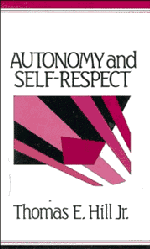Book contents
- Frontmatter
- Contents
- Sources and acknowledgments
- Introduction
- 1 Servility and self-respect
- 2 Self-respect reconsidered
- 3 Autonomy and benevolent lies
- 4 The importance of autonomy
- 5 Symbolic protest and calculated silence
- 6 Moral purity and the lesser evil
- 7 Self-regarding suicide: a modified Kantian view
- 8 Ideals of human excellence and preserving natural environments
- 9 Weakness of will and character
- 10 Promises to oneself
- 11 Social snobbery and human dignity
- 12 Pains and projects: justifying to oneself
- 13 The message of affirmative action
- Index
12 - Pains and projects: justifying to oneself
Published online by Cambridge University Press: 05 June 2012
- Frontmatter
- Contents
- Sources and acknowledgments
- Introduction
- 1 Servility and self-respect
- 2 Self-respect reconsidered
- 3 Autonomy and benevolent lies
- 4 The importance of autonomy
- 5 Symbolic protest and calculated silence
- 6 Moral purity and the lesser evil
- 7 Self-regarding suicide: a modified Kantian view
- 8 Ideals of human excellence and preserving natural environments
- 9 Weakness of will and character
- 10 Promises to oneself
- 11 Social snobbery and human dignity
- 12 Pains and projects: justifying to oneself
- 13 The message of affirmative action
- Index
Summary
My reflections start from three directions. First, in his very stimulating new book, The View From Nowhere, Thomas Nagel argues that pains and projects give us quite different sorts of reasons for acting. Pains, he says, are bad in themselves whereas the nonfulfillment of individuals' personal projects is not; pains, unlike projects, are inherently reasons for acting. In deciding how to treat others, then, it is irrational, barring counterreasons, to fail to alleviate another's pain but not to fail to contribute to another's projects. While this is intuitively plausible in the examples he considers, I am doubtful about the general thesis.
Second, as I review classic theories of practical reason, and recent modifications, I often find their implications for particular cases counterintuitive. Present-time preference theories, for example, require too little concern for one's future, and prudential theories go too far when they try to make up this deficiency by insisting that rational choice requires maximization over time of some special factor, such as desire, cognitively refined desire, or balance of pleasure and pain. But intuitions differ, and many theorists seem little concerned about counterintuitive results. This leads me to suspect that much of the disagreement is rooted in the fact that theories of practical reason are designed for quite different purposes. A theory that works well enough for one purpose, say, explanation and prediction, may fail to serve other purposes, such as those of moral theory or analysis of ordinary meaning.
- Type
- Chapter
- Information
- Autonomy and Self-Respect , pp. 173 - 188Publisher: Cambridge University PressPrint publication year: 1991
- 4
- Cited by



